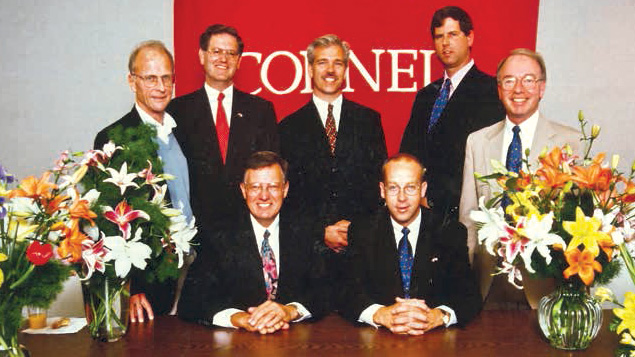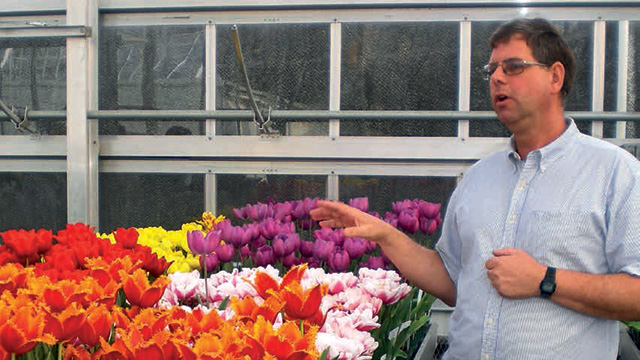 Flower bulb expert Bill Miller is featured in a new book 50 years of flowerbulb research in North America, published by Anthos, the Dutch flower bulb exporters association. Miller is a professor in the Horticulture Section of the School of Integrative Plant Science and director of Cornell’s Flower Bulb Research Program.
Flower bulb expert Bill Miller is featured in a new book 50 years of flowerbulb research in North America, published by Anthos, the Dutch flower bulb exporters association. Miller is a professor in the Horticulture Section of the School of Integrative Plant Science and director of Cornell’s Flower Bulb Research Program.
The Dutch began funding flower bulb research in the U.S. in 1965, sponsoring a program at Michigan State University. “The Dutch were very forward-thinking,” says Miller. “They realized that they would sell more bulbs to U.S. growers if the growers on this side of the Atlantic had technical support — in English.
“This was back before the Internet,” he adds. “If a grower forcing half a million bulbs in his greenhouse had a problem, it’s not like he could send a letter to the Netherlands and get an answer in time to solve it.”
The Dutch strategy paid off. Bulb and forced flower bulb retail sales in the U.S. easily top $125 million, says Miller.
The Dutch-funded research program shifted to North Carolina State University in 1978 before coming to Cornell in 1998. Miller, the son of a lily grower and an authority on flower bulb physiology, has headed the program since.

The Cornell research program has focused on testing new varieties, helping growers time their blooms to hit holiday markets, and using plant growth regulators to control the height of potted bulbs. Each year, Miller hosts a Dutch intern to assist with the research.
In addition to forcing studies, Miller has also conducted studies to determine which landscape flower bulbs are least likely to be damaged by deer and voles and other topics.
Perhaps Miller’s most celebrated study came in 2005 when a New York Times columnist asked him about the veracity of the folk wisdom that you can use alcohol to keep forced paperwhites from growing too tall, a dilemma faced by thousands of bulb enthusiasts every winter. To find out, Miller initiated a research project carried out by undergraduate Erin Finan.
Finan’s study determined that the most effective way to keep paperwhites from flopping over is to grow them in a 4 to 6 percent alcohol solution, or 1 part 80-proof liquor to 7 parts water.
The study went viral, with the technique receiving coverage in Parade Magazine, der Spiegel, CNN and countless magazine articles, blog posts and newscasts.
“You can still tell when the winter forcing season is coming on because you’ll start seeing ‘pickle your paperwhite’ articles citing the study,” says Miller.



